From Barry to the Blues — The Keith Webber Story
The Welshman's time at Everton got off to a dream start but he would later admit to ruing the decision to leave Goodison Park in search of first-team football in 1963
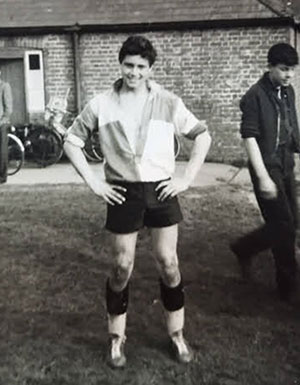
A young Keith Webber before joining Everton
Born in Cardiff on 5 January 1943, Keith Webber grew up idolising his footballing countrymen Trevor Ford and John Charles. A gifted scholar with a talent for numbers, his parents hoped that he would attend university and, perhaps, go into accountancy. However, Keith’s passion for sport was matched by his all-round ability. The Glamorganshire schoolboy long-jump record holder and the Cardiff Schools 220-yard sprint champion also played rugby at wing three-quarter for his school. However, he would also turn out (under an assumed name) as an amateur footballer for Barry Town, alongside his brother, Malcolm. He was spotted by Harry Haslam (later the manager of Luton Town and Sheffield United) and recommended to Everton manager Johnny Carey. Invited up to Merseyside for a few trial matches, he signed professional forms for the Blues in February 1960, having turned 17. Barry Town received a £50 donation as a gesture of goodwill.
In October of the same year, the teenager caught the eye of the Toffees’ full-back Alex Parker, who enthused in his Liverpool Echo column about the Welshman’s four-goal salvo - including a 30-yard piledriver - in a heavy FA Youth Cup defeat of much-fancied Burnley. Just weeks later he was called up to the first team for a League Cup tie against Walsall at Goodison Park. Coming into the team at centre-forward in place of Jimmy Harris (and flanked by Roy Vernon and Bobby Collins), his debut got off to a dream start when netting the Blues’ equaliser with a sweetly-struck left-footed effort. The watching Horace Yates of the Daily Post, tried to dampen expectations stating: ‘As the game unfolded it was increasingly apparent that for all his shooting ability, there is the inevitable rawness one can only expert. I am afraid must be that he needs further time to develop before he can reasonably be expected to do himself justice.’ With Keith in the side, the young Toffees reached the 1961 Youth Cup final, before falling at the final hurdle to Chelsea. Keith was given two further tastes of senior action that season, in a League Cup quarter-final defeat to Shrewsbury, and in a home league match against Chelsea. Able to play across the front line but probably best as a wide striker he was a natural athlete who frequently come first in club time trials.
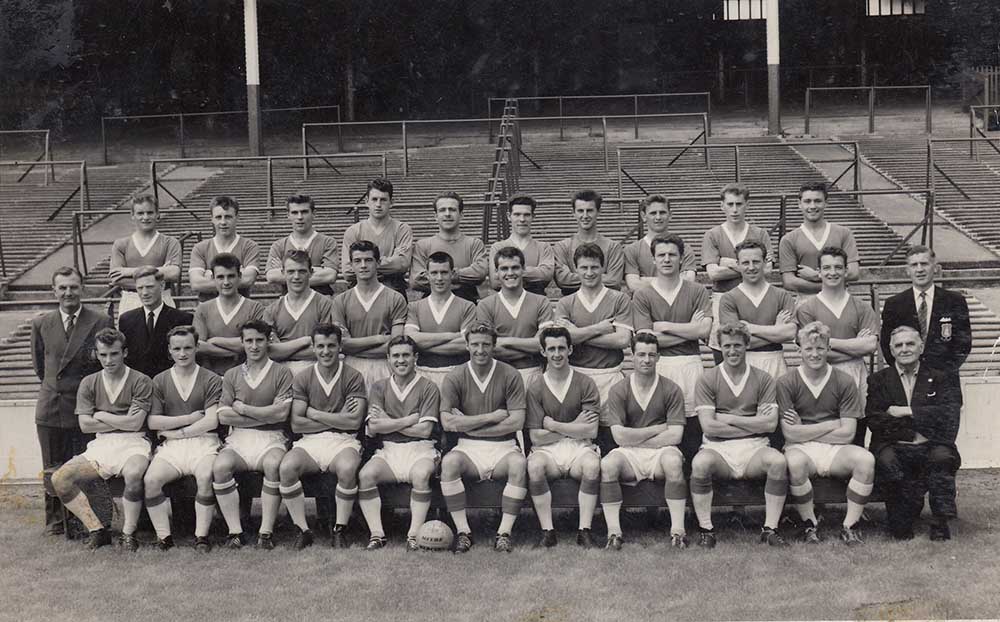
Keith (back row, far right) with the Everton squad in 1960
Keith credited Harry Catterick, Carey’s replacement, with having the greatest influence on him (‘He didn’t mince his words’). But the former Sheffield Wednesday supremo was less inclined than Carey to blood the youngster. Given a couple of starts early in the 1961/62 season, he could not add to his goal tally, so continued learning his trade in the reserve team. There was no shame in this, when one considers that Roy Vernon, Alex Young, Bobby Collins, Dennis Stevens, John Morrissey, Derek Temple and Frank Wignall were in the mix for forward places in this era. Years later Keith would express his delight at training alongside the ‘Golden Vision’, describing his artistry as ‘second to none’. The Central League was a tough learning ground, as encapsulated by Keith’s recollection of an encounter with former England full-back Tommy Banks, of Bolton Wanderers. Before kick-off the veteran advised the Welsh forward: ‘The tell ma, lad, that thar can run a bit. Well, al tell thee summut, thee may gor past me, the ball may gor past me. But the ball and thee together, never!’ True to his word, Banks flattened Keith in the early minutes, followed by the words: ‘I told thee so, didna?’ Despite the roughhouse tactics of defenders like Banks, Keith contributed 16 goals for the second string in the 1961/62 season and 20 in the subsequent campaign.
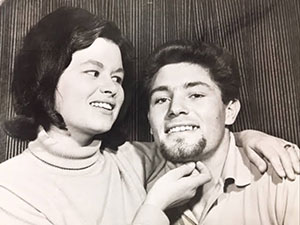
Barbara inspects Keith's 'lucky beard' in 1964
Across the road from the famous stadium was a café which did a decent trade and was frequented by Blues players in their down-time. The niece of the owners, Barbara Carr, caught the eye of Keith and, with some prompting by her aunt and uncle, a date was arranged. They were soon going steady – a talented pair of dancers who once won a Twist competition, they enjoyed nights out at the Cavern (Barbara recalls: ‘I must have seen the Beatles when they were beginning – I saw a lot of singers and guitarists’), Grafton Rooms, Downbeat and Locarno. Barbara, who described Keith as ‘a charmer who was pally with everybody’, tied the knot with her fiancé in 1963.
As the Toffees closed on the League title in April 1963, Keith watched the Blues take on Blackburn Rovers. Later that day he was a Brighton and Hove Albion player. The Seagulls secretary had travelled north and agreed a £6,000 transfer fee. Seeing his path to the first team blocked for the foreseeable future, Keith agreed to the move, telling a south coast newspaper: ‘It was very discouraging at Everton. As soon as any first team player was injured, they would go out and buy. This was unsettling for reserves. From what I have seen already at Brighton I like it; they are a great bunch of lads.’
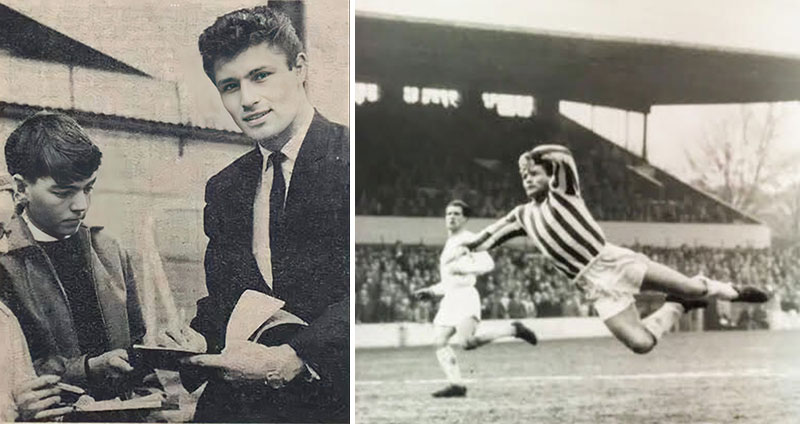
Left: Giving an autograph to a Bright and Hove Albion supporter after joining in 1963; Right: Taking flight for the Seagulls
Although he enjoyed his productive spell in Sussex (15 goals in 38 appearances) and became a father to the first of two daughters, he did have reason to rue leaving Goodison. Years later, when asked for his unhappiest moment in football he explained: ‘In retrospect, leaving Everton. The decision was down entirely to me. The opportunity for regular first team football, which had been denied me at Goodison Park, swayed my decision. But Everton ran into a stack of injuries, I must have got my first team chance, and who knows what would have happened then. To have appeared in the squad of a European game would have been the icing on the cake.’
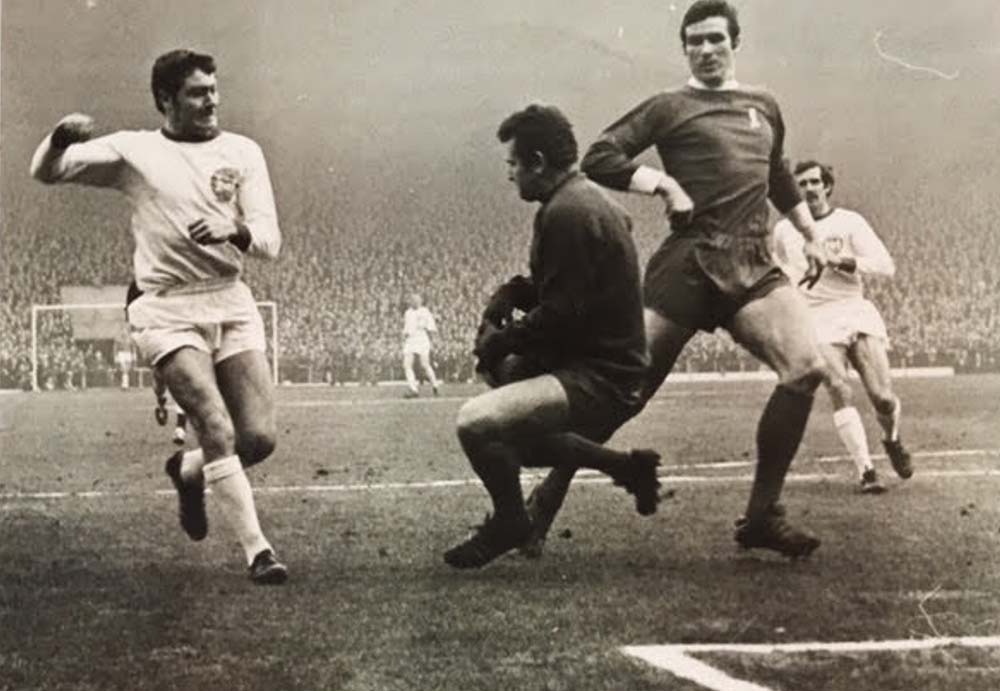
Keith action for Doncaster Rovers at Anfield in 1969
After 17-months at the Goldstone Ground, in which he played in several roles, the Welshman headed north to play for Wrexham. Like many footballers, he was superstitious, and stopped shaving when he went on a scoring run for the Dragons. The resultant goatee beard - with daughter and wife looking on - was photographed for the Liverpool Echo and Evening Express. In the summer of 1966 came a move across the Pennines to Doncaster Rovers, managed by under up-and-coming manager Lawrie McMenemy. He recalls: ‘Keith was quite happy to win the ball and give it to somebody else to score. He was that sort of lad, a good team player – happy for other people to take the headlines.’ For Rovers the forward enjoyed promotion (as champions) from the Fourth Division and had the pleasure of playing in a January 1969 FA Cup tie at Anfield – a valiant 2-0 defeat.
Troubled by a knee complaint for much of the 1968/69 campaign, he moved to Chester in the summer of 1969, scoring 17 times in 87 appearances. Released in 1971, the forward had a last hoorah in League football at Stockport County in 1971/72, managed by former Everton player Matt Woods. He ended on 331 first class appearances, contributing 92 goals. He was overlooked for international honours at any level throughout his career. He wound down his career with brief spells at Northwich, Oswestry and Rhyl. More cerebral than the typical footballer, when asked if he would have changed anything in his decade as a professional, he replied: ‘Not a thing. I guess it would work out just the same. I’ve been around, been paid to keep myself fit and play a game I love and met some great people. Why should I want to change any of that?’
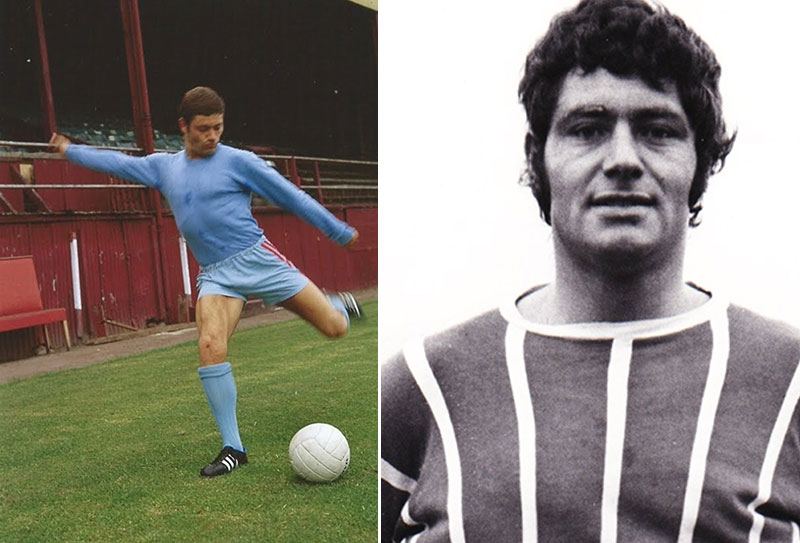
Left: Chester's forward poses for the camera; Right: A Football League farewell with Stockport County
Keith had taken coaching badges and intimated that he’d like to stay in the game in a managerial or coaching capacity – however this didn’t come to pass. He worked in insurance sales for the Prudential before becoming licensee of the Grosvenor Arms (known as Clubbies) in Handbridge, Chester. He was photographed by the local press hanging up his football boots above the bar (although he made a few appearances in the back four for Handbridge Park, the team based at the pub). Barbara recalls her husband was well-suited to the role of landlord: ‘He seemed to draw people to him, once they knew who he was. He could talk with anyone about any subject.’ A handy cricket batsman and pool player, who also enjoyed a round of golf, and Keith also professed to a love of music and record-collecting – notably jazz and classics. He also followed with interest the singing career of fellow South Walian Shirley Bassey.
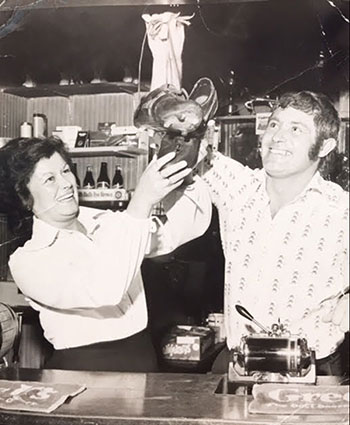
Hanging up the football boots, as Keith enters the pub trade
Keith subsequently ran the White Lion pub in Buckley with his second wife, Val. A period of ill-health in the early 1980s forced a change of career, so Keith worked for Wagon Finance in Mold. At some point during the later stages of his playing career, Keith had been diagnosed with a heart abnormality – a hereditary condition. His father and brother Malcolm suffered fatal heart attacks, whilst his other brother, Alan, survived one. So it came to pass that Keith life was cut cruelly short, at 40, by a fatal cardiac episode whilst watching TV at home in Marford on 26 September 1983. He was laid to rest at Rossett Christ Church.
Dedicated to Alan Webber (1946-2022)
Thanks to:
Keith Webber’s Family
Colin Green
Derek Temple
Lawrie McMenemy
Marcus Heap (Stockport County historian)
Spencer Vignes
Sources:
Various newspapers
bluecorrespondent.co.uk
evertonresults.com
enfa.co.uk
Images are taken from the Webber family collection
 Follow @robsawyer70
Follow @robsawyer70
Reader Comments (8)
Note: the following content is not moderated or vetted by the site owners at the time of submission. Comments are the responsibility of the poster. Disclaimer ()
2 Posted 24/10/2022 at 10:33:42
Sounds a rounded and grounded individual, good academically, gifted sportsman, and a decent bloke.
Thanks for another cracking article, Rob.
3 Posted 24/10/2022 at 10:52:56
I like the way Horace Yates dampened expectations; more realistic than some of the modern day scribblers who are inclined to talk up a player's international prospects after a handful of first-team appearances.
4 Posted 24/10/2022 at 12:39:01
Yes ٧,000 was a decent su those days and what you got from Keith was a whole-hearted performance from a player who put the team first. I saw him quite few times for the youth and reserve teams.
Horace Yeats was a good reporter who wrote what he saw and his description of Keith was pretty accurate. As Keith himself said, he made a good career out a game he enjoyed playing and met a lot of great people, so why would he change any of that?
Just a great shame he died so young.
5 Posted 24/10/2022 at 15:20:37
Disappointing doesn't cover it. How is it possible to cock up chips?
6 Posted 24/10/2022 at 15:38:32
I see you got some help off Colin Green in writing your story of Keith Webber, is that the same Colin Green who played left-back for Everton and Wales?
If it is it would be interesting to know how his career progressed after leaving Everton for Birmingham City.
7 Posted 24/10/2022 at 23:44:50
I was saddened to hear that Keith Webber died so young. I particularly remember his League debut for Everton against Chelsea in February 1961 as it was my first ever visit to Goodison.
Peter Kavanagh also made his debut in the match which was a 1-1 draw, two legends scoring the goals, Jimmy Greaves and Roy Vernon. I remember being disappointed that Keith was selected to replace the injured Alex Young but I did follow his career with interest and remember him leaving for Brighton.
I was also fascinated to read about Keith's encounter with Tommy Banks, one of Bolton's squad of exceptionally tough defenders. Wigan Athletic were my second team in their non-league days and I saw Tommy play for Bangor City against them towards the end of his career c1963. He was truly fearsome. According to Wikipedia he is still with us, approaching his 93rd birthday.
Dave@6
I remember seeing Colin Green, a decent full back, play against us for Birmingham City where he had a good career.
8 Posted 26/03/2023 at 21:22:21
Keith is the main reason I'm an Evertonian. He and Val were good friends of my parents. Sadly ,both he and my Dad passed away too young but I remember him waxing lyrical about Everton when I was a kid, and it rubbed off.
Just sent the article on to my mum and her simple reply summed him up.
“Bloody good lad, Keith was.â€
Add Your Comments
In order to post a comment, you need to be logged in as a registered user of the site.
Or Sign up as a ToffeeWeb Member — it's free, takes just a few minutes and will allow you to post your comments on articles and Talking Points submissions across the site.
How to get rid of these ads and support TW


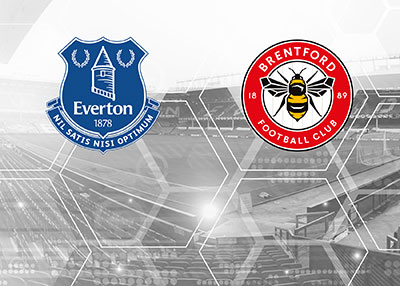








1 Posted 24/10/2022 at 07:57:21
He sounds like a handy sportsman and a nice guy, with a life cut short.